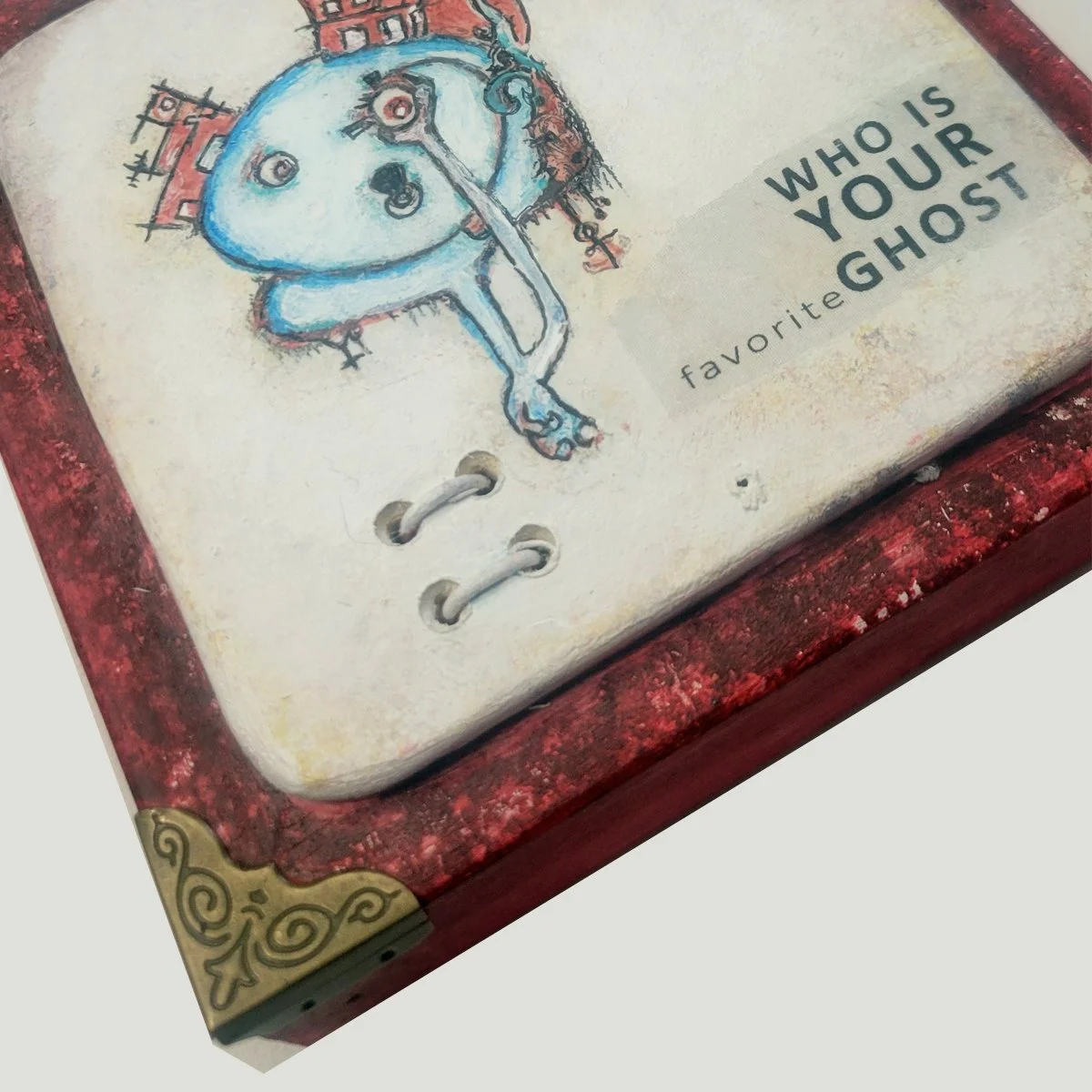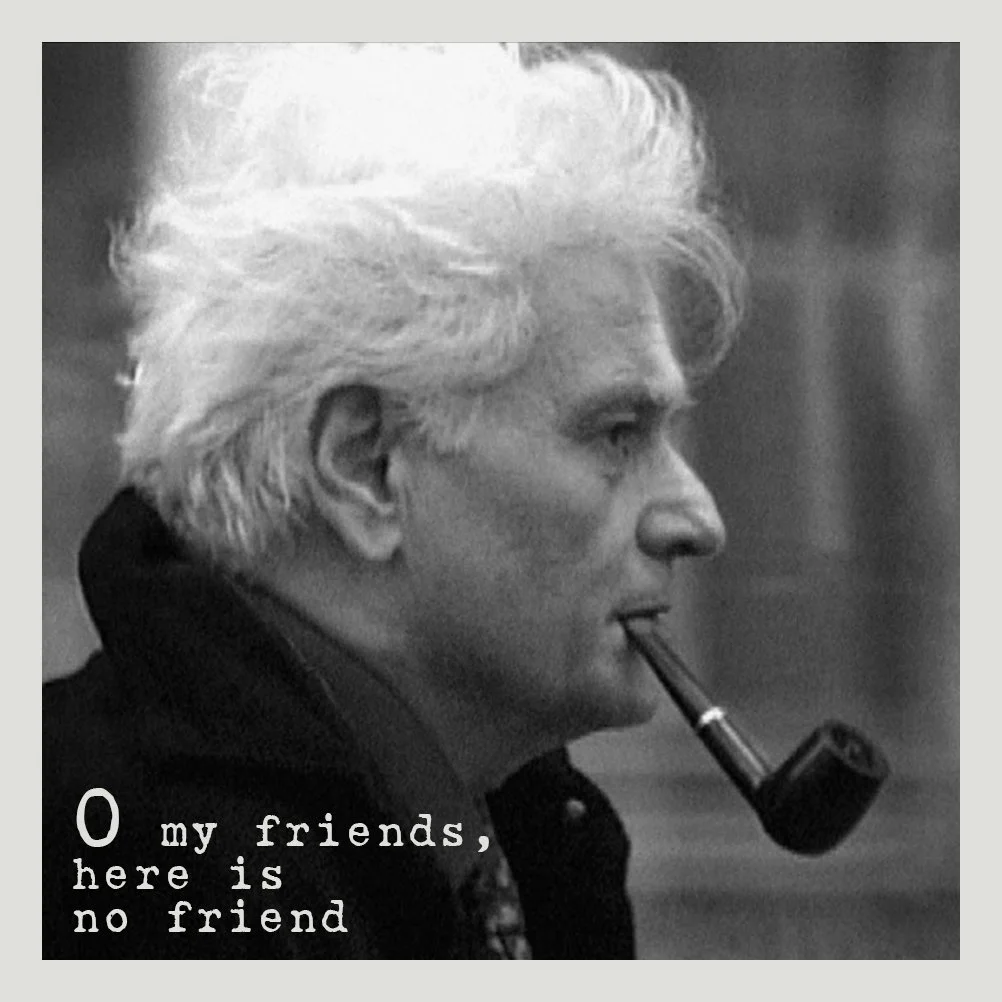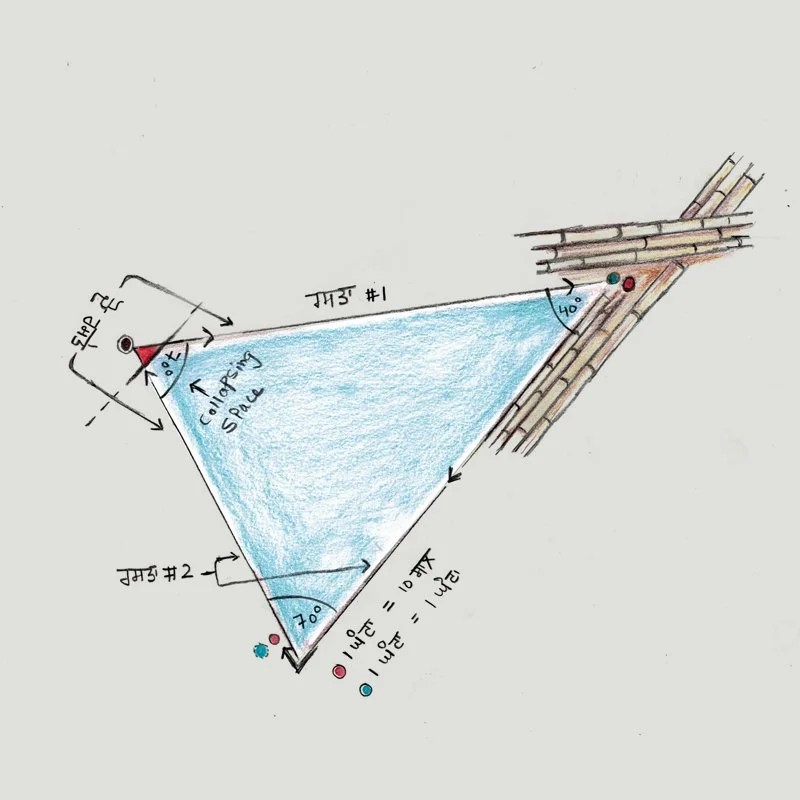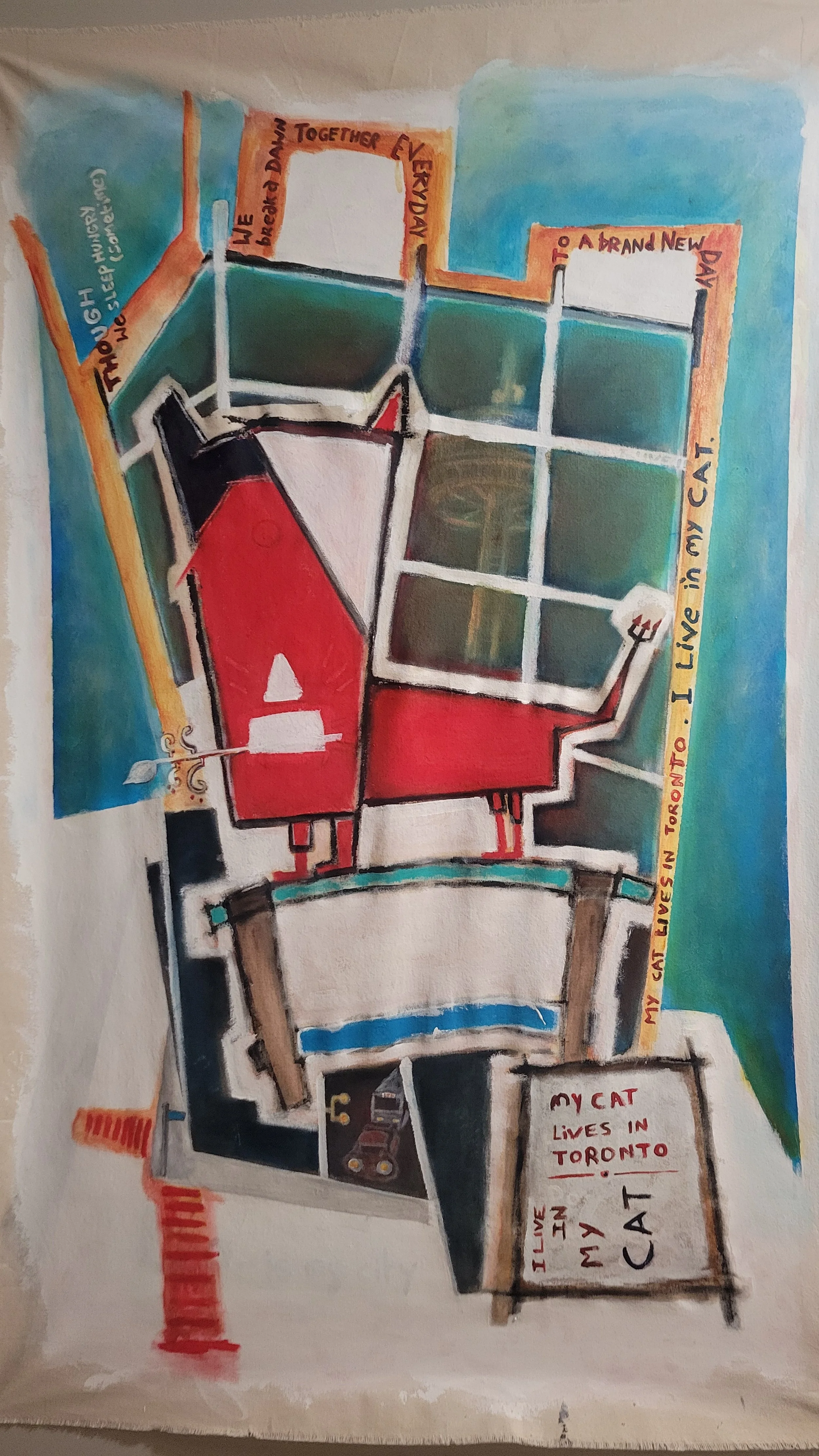

ਹਜਾ
Measure years with my knuckles, I tighten them into my fist. With fingertips I stretch a canvas. It sounds like no big deal, but inside my fist, I catch a six-foot long snake. Its belly holds all my age- 50 years.
Stretch it and it grows longer, like letters. Pull too hard and the paper tears; leave it slack and the note slips. I hear a slippery note in my ears, it plays on a loop. I first mimic it, then put a finger on it, rub it. It greases itself, sings back, never disappears.

The Banshees of Inisherin
Ending this year on a good salty-note. There’s a whole lot of Derrida in the Banshees. Make sure your Donkey’s out.

Quadratics 101
A slow glide and fall with the parabola. Kisses the x-axis once, sometimes twice, sometimes not at all. No grading/marking, and do not use Desmos, or you will miss the point of it (FUN). Self-paced, 4–6 hours a week/4weeks. Answers may be singular, multiple, or existentially absent. Indulgence required; calculators will feel neglected. Buckle up.

ਗੰਦੁ-ਮੰਦੁ ਸੁਪਨੇ
ਧਰਤ-ਮਾਤਾ ਤੇ ਮੁਢਲਾ ਗਣਿਤ | Draft I
ਓਹ ਮੇਰੇ ਪਾੱਸੇ ਲੰਮੀ ਪਈ ਏ। ਅਸੀਂ ਛੱਤ ਨੂੰ ਚੁੱਕ ਕੇ ਰਖਦੇ ਬੱਲਿਆਂ ਵੱਲ ਪਏ ਵੇਖਦੇ ਵਾਂ। ਮਸਾਂ 15 ਕੁ ਵਰ੍ਹਿਆਂ ਦੀ ਏ , ਤੇ ਓਹਦੀਆਂ ਦੂਧੀਆਂ ਅਜੇ ਮੇਰੇ ਜੇਡੀਆ ਹੀ ਨ। ਭਾਵੇਂ ਮੈਂ ਕੋਈ ਦੁਧਾਰੂ ਜੀਵ ਨਹੀਂ ਵਾਂ। ਮੈਨੂੰ ਓਹਦੀਆਂ ਦੁਧੀਆਂ ਬਾਰੇ ਦਸਣਾ ਚੰਗਾ ਲਗਦਾ ਏ। ਓਦ੍ਹੇ ਘਰ ਦਿਆਂ ਨੂੰ ਪਤਾ ਏ, ਬਿਨ੍ਹਾਂ ਖੜਕਾ ਕਰਿਆਂ ਕਈ ਵਾਰ ਸਾਡੇ ਵਿਚਾਲਿ਼ਓ ਨਿਕਲ ਜਾਵੰਦੇ ਨ। ਓਹ ਮੇਰੇ ਨਾਲ਼ੋਂ ਲੰਮੀ ਏ, ਪਰ ਮੇਰੇ ਵਰਗੀ ਹੀ ਪਤਲੀ। ਅਸੀਂ ਛੇੜ ਨਾਲ਼ ਓਹਨੂੰ ਧਰਤਮਾਤਾ ਆਖਦੇ ਵਾਂ।
ਮੈਂ ਇਕ ਘੰਟੇ ਚ 10 ਸਾਲ ਬੁੱਢਾ ਹੋਵੰਦਾ ਵਾਂ। ਧਰਤਮਾਤਾ 15 ਕੁ ਦੀ ਹੀ ਰਹਿੰਦੀ ਏ, ਤੇ ਇਕ ਘੰਟੇ ਚ ਸਿਰਫ਼ ਇਕ ਘੰਟਾ ਵਧਦੀ ਏ। ਮੈਂ ਪੰਜਾਹ ਸਾੱਲਾਂ ਦਾ ਓਦ੍ਹੇ ਨਾਲ਼ ਪਿਆ ਵਾਂ। ਮੈਂਨੂੰ ਘਰ ਜਾਣਾ ਚਾਹੀਦਾ ਏ, ਅਜਿਹਾ ਓ ਹ ਸੋਚਦੀ ਏ। ਮੈਂ ਵੀ ਸਮਝਦਾ ਵਾਂ, ਪਰ ਮੇਰਾ ਜਾਵਣ ਦਾ ਚਿੱਤ ਨਹੀਂ ਕਰਦਾ। ਅਖੀਰ ਆਪ ਹੀ ਚੱਪਲ ਪਾ ਕੇ ਕਹਿੰਦੀ ਏ, “ਚੱਲ ਮੈਂ ਤੈਂ-ਨੂੰ ਛੱਡ ਕੇ ਆਵੰਦੀ ਵਾਂ”— ਮੈਂਨੂੰ ਚਾਅ ਚੜ੍ਹ ਜਾਵੰਦਾ ਏ।
ਮੈਂ ਇਹ-ਦੇ ਪਿੰਡ ਚ ਹੀ ਕਿਸੇ ਕਮਰੇ ਜਿਹੇ ਚ ਰਹਿੰਦਾ ਵਾਂ। ਰਸਤੇ ਚ ਤ੍ਰਿਕੋਣਾ ਤਲਾਅ ਆਵੰਦਾ ਏ। ਜਦੋਂ ਅਸੀਂ ਇਸ ਤਲਾਅ ਦੇ ਖੱਬੇ ਬੰਨਿਓ ਲੰਘਦੇ ਵਾਂ, ਤਾਂ ਮੈਂ ਓਹਨੂੰ ਦਸਦਾ ਵਾਂ, “ ਮੈਂ ਤੇਰੇ ਕੋਲ਼ ਦੂਏ ਬੰਨਿਓ ਗਿਆ ਸਾਂ।” ਓਹ ਹਸਦੀ ਆਖਦੀ ਏ, “ਅਸੀਂ ਪਿਛਲੀ ਵਾਰ ਜਦੋਂ ਦੂਏ ਬੰਨਿਓ ਲੰਘੇ ਸਾਂ, ਤਾਂ ਵੀ ਤੂੰ ਅੰਝ ਹੀ ਆਖਿਆ ਸਾ।”
- ਆਹੋ, ਤੇ ਮੈਂ ਤਾਂ ਹੀ ਏਨਾਂ ਹੈਰਾਨ ਹੋਵੰਦਾ ਵਾਂ— ਤ੍ਰਿਕੋਣ ਕਿਵੇਂ ਸੰਭਵ ਏ? ਨਾ ਹੋਣ ਦਾ ਪਤਾ ਏ— ਕਿ ਕੁਝ ਵੀ ਹੋ ਸਕਦਾ ਏ। ਜੇ ਅਸੀਂ ਨਾ ਹੋਂਦੇ, ਤਾਂ ਹੋ ਸਕਦੇ ਸਾਂ। ਬਿੰਦੂ ਦਾ ਪਤਾ ਏ— ਕੁਝ ਹੋਣਾ, ਪਰ ਕਿਤੇ ਨਾ ਜਾਣਾ। ਜੇ ਕੋਈ ਘਰੋਂ ਤੁਰੇ ਹੀ ਨਾ, ਨਾ ਕਿਹੇ-ਥਾਂ ਜਾਵੇ ਨਾ ਕਿਹੋ-ਥਾਵੋਂ ਆਏ। ਲਾਇਨ ਦਾ ਪਤਾ ਏ, ਕੇ ਕਿਸੇ-ਥਾਓ ਕਿਸੇ ਹੋਰ ਥਾਂ ਦਾ ਰਸਤਾ। ਜੇ ਕਿਸੇ ਕੋਲ਼ ਜਾਵਣ ਲਈ ਤੁਰੋ ਤਾਂ— ਜਾਵਣਾ, ਤੇ ਜੇ ਓਸੇ ਰਸਤੇ ਘਰ ਮੁੜੋ, ਤਾਂ —ਆਵਣਾ। ਤੇਰੇ ਵੱਲੋਂ ਇਹੀ ਗੱਲ ਤੂੰ ਪੁੱਠੀ ਕਹਿਣੀ ਏ, ਕਿਓਕਿ ਤੂੰ ਮੇਰੇ ਨਾਲ਼ੋਂ ਪੁੱਠੀ ਏਂ। ਕਿਹੇ ਹੋਰ ਥਾਂ ਹੋਣਾ, ਪੁੱਠੇ ਹੋਣਾ ਹੋਂਦਾ ਏ। ਪਰ ਕੋਈ ਘਰ ਵਾਪਿਸ ਮੁੜਨ ਦੀ ਥਾਂ ਕਿਸੇ ਹੋਰ ਰਾਹੇ ਵੀ ਪੈ ਸਕਦਾ ਏ, ਯਾਨੀ ਨਵੀਂ ਲਕੀਰ `ਤੇ ਵੀ ਤੁਰ ਸਕਦਾ ਏ— ਦੋ ਲਕੀਰਾਂ, ਜਿਹੜੀਆਂ ਮੈਂ ਤੇਰੇ ਨਾਲ਼ ਜੋੜਦਾ ਵਾਂ Two lines with angle between them। ਪਰ ਤ੍ਰਿਕੋਣ?
ਮੰਨ ਲਓ ਇਦ੍ਹਾ base ਸਾਡੇ ਵਿਚਾਲ਼ੀ ਵਿੱਥ ਏ। ਜੇ ਦੋਵੇਂ ਜਣੇ separated by space ਕਿਤ-ਥੇ ਵੀ ਜਾਵਣ, ਦੋ ਲਾਕਰਾਂ ਬਣਦੀਆਂ ਨ (ਦੋ ਰਸਤੇ, ਜਿਹੜੇ ਜੁੜ ਵੀ ਸਕਦੈ ਨ, ਨਹੀਂ ਵੀ)। ਮੇਰੀ ਚੀਕ ਓਦੋਂ ਵਜਦੀ ਏ, ਜਦੋਂ ਮੋੜ ਤੇ ਪੁੱਜ ਕੇ ਚਾਣਚਕ ਹੀ ਸਾਰੀ space ਤੇ ਸਾਰਾ ਪਾਣੀ (ਤਲਾਅ) ਮੁੱਕ ਜਾਵੰਦਾ ਏ, ਤੇ ਰਸਤਿਆਂ ਦਾ ਕੋਈ ਮਤਲਬ ਨਹੀਂ ਰਹਿੰਦਾ। Line ਭਾਵੇਂ ਸਾਰੀ ਉਮਰ ਤੁਰਦੀ ਰਹਵੇ , ਤਾਂ ਹੀ ਮੁਕਦੀ ਏ ਜੇ ਤੁਰਨੋਂ ਹਟ ਜਾਵੇ। Line ਤਾਂ ਹੋਂਦੀ ਏ, ਪਰ ਮੁੱਕ ਗਈ Line. ਜੇ ਇਹ ਤਿੰਨ ਵਾਰ ਮੁੜ੍ਹ ਕੇ ਘਰ ਪੁੱਜ ਜਾਵੇ ਤਾਂ Space ਫਸ ਜਵੰਦੀ ਏ, ਬਾਹਰ ਤੇ ਅੰਦਰ ਦਾ ਭੇਦ ਭੁਲੇਖਾ ਪੈਵੰਦਾ ਏ। ਇਤ-ਥਾਂ ਤ੍ਰਿਕੋਣ ਦੀ death ਹੋਂਦੀ ਏ, ਉਹਦਾ ਸਮਾਂ ਮੁੱਕ ਜਵੰਦਾ ਏ। ਤਾਂ ਮੈਂ ਹਰ ਵਾਰ ਯਾਦਾਸ਼ਤ ਦੀ ਚਲਾਕੀ ਫੜ ਲੈਵੰਦਾ ਵਾਂ, ਤੇ ਖੀਵਾ ਹੋਵਿਆ ਤੈਂ-ਨੂੰ ਦੱਸਣ ਬਹਿ ਜਾਵੰਦਾ ਵਾਂ। ਤ੍ਰਿਕੋਨ, ਰਸਤਾ ਤੇ ਵਿੱਥ— ਅਸਲ ਚ ਸਮਾਂ ਨ।
ਮੈਂ ਕਿਸੇ ਹੋਰ ਰਾਹੇ ਤੁਰਦਾ ਮੁੜ੍ਹ ਘਰ ਪੁੱਜ ਜਾਵਾਂ। ਇਹ ਕਿੰਝ ਕਰ ਸੰਭਵ ਏ? ਤੇ ਇਹ ਕੀ ਗੱਲ ਹੋਈ ਕਿ ਘਰ ਮੁੜਨ ਦਾ ਇਕ ਹੋਰ ਰਾਹ ਸਾੱਡੇ ਖੱਬੇ ਬੰਨੇ ਵੀ ਹੈ ਵੇ, ਲਭਦਾ ਏ। ਜੇ ਚੀਜ਼ਾਂ ਇਕ ਨਾਲ਼ੋਂ ਵੱਧ ਹੋ ਸਕਦੀਆਂ ਨੇ ਤਾਂ ਸਮਾਂ confuse ਹੋ ਜਾਵੰਦਾ ਏ। ਤਾਂ ਹੀ ਇਹ ਤ੍ਰਿਕੋਣ ਦੀ ਚੁੰਝ ਚ ਫ਼ਸ ਜਾਵੰਦਾ ਏ ਤੇ ਸਾਰੀ space collapse ਹੋ ਜਾਵੰਦੀ ਏ।
- ਹਾਂ। ਤੇਰੀ ਉਮਰ ਦੀ ਭੰਵਾਟਣੀ ਬਹੁੰ ਤੇਜ਼ ਏ, ਤਾਂ ਹੀ ਤੂੰ ਘੰਟਿਆਂ ਚ ਬੁੱਢਾ ਹੋਵੰਦਾ ਵੈਂ। ਮੈਂ ਹੌਲ਼ੀ-ਹੌਲ਼ੀ ਘੁੰਮਦੀ ਵਾਂ, ਮੈਂ-ਨੂੰ ਤ੍ਰਿਕੋਣਾਂ ਦੀਆਂ ਸ਼ਰਾਰਤਾਂ ਦਿਸਦੀਆਂ ਨ। Speed ਕਾਰਨ ਤੈਨੂੰ ਸਾਰਾ ਕੁਝ blur ਦਿਸਦਾ ਏ।
ਇਕ ਨਿੱਘੀ ਜੱਫੀ ਤੋਂ ਬਾਅਦ ਦਾ ਸੁਪਨਾ ਮੈਂ-ਨੂੰ ਯਾਦ ਨਹੀਂ। ਕੋਈ ਲੋੜ੍ਹ ਵੀ ਨਹੀਂ ਕਿਓਕਿ ਮੈਂ ਮੁੜ੍ਹ ਓਹਨੂੰ ਨਹੀਂ ਮਿਲਨਾ। ਮੇਰੇ ਕੋਲ਼ ਕੁਝ ਆਰਾਮ ਕਰਨ ਲਈ ਦੋ-ਚਾਰ ਘੰਟੇ ਹੈ-ਨ। ਮੈਂ ਓਹ-ਦੇ `ਤੇ ਜੰਮਿਆ ਵਾਂ, ਤਾਂ ਹੀ ਓਹ ਜੁਆਨ ਰਹਿੰਦੀ ਏ। ਤਾਂ ਹੀ ਓਹਨੂੰ ਸਭ ਕੁਝ ਪਤਾ ਏ।
ਦੋ-ਚਾਰ ਘੰਟਿਆਂ ਚ ਮੈਂ ਹੋਣੋ ਹਟ ਜਾਵੰਦਾ ਵਾਂ। ਪਹਿਲਾਂ ਮੈਂ ਦੋ ਰਸਤਿਆਂ ਦੇ ਰਹਿਸ ਨੂੰ ਭੁੱਲ ਜਾਵੰਦਾ ਰਿਹਾਂ, ਹੁਣ ਮੈਂ ਧਰਤਮਾਤਾ ਦੀ ਸਾਰੀ ਗੱਲ ਵੀ ਭੁੱਲ ਜਾਵੰਦਾ ਵਾਂ। ਬੱਸ ਏਨਾਂ ਕੁ ਯਾਦ ਏ ਕਿ ਅਸੀਂ ਭੁੰਜੇ ਲੰਮੇ ਪਏ ਛੱਤ `ਪਰ ਪਏ ਬਾੱਲਿਆਂ ਵੱਲ ਵੇਖਦੇ ਸਾਂ।


ਈਵਾਨ ਬੀਲੀਬਿਨ ਲਹੀ| Для Ивана Билибина
ਜਿਹ ਨੇ 1966 ਵਿਚ ਛਪੀ ਰੂਸੀ ਪਰੀ-ਕਹਾਣੀਆਂ ਦੀ ਕਿਤਾਬ Василиса прекрасная/ ਰੂਪਵੰਤੀ ਵਾਸੀਲੀਸਾ/ Vasilisa the Beautiful ਵਿਚ ਰੂਪਕਾਰੀ ਕੀਤੀ
ਪੰਜਾਬ ਬੁਕ ਸੈਂਟਰ ਨੇ 1983/86 ਵਿਚ ਰੂਸੀ ਪਰੀ-ਕਹਾਣੀਆਂ ਨਾਂ ਦੀ ਕਿਤਾਬ ਦਾ ਪੰਜਾਬੀ ਅਨੁਵਾਦ ਛਾੱਪਿਆ, ਪਰ ਕਿਤਾਬ ਦਾ ਟਾਇਟਲ ਰੂਪਵੰਤੀ ਵਸੀਲੀਸਾ ਰੱਖਿਆ, ਜੋ ਅਸਲ ਚ ਇਨ੍ਹਾਂ ਕਹਾਣੀਆਂ ਚੋਂ ਪਹਿਲੀ ਕਹਾਣੀ ਏ। ਇਸ ਕਿਤਾਬ ਚ ਰੂਪਕਾਰ ਦਾ ਨਾਂ ਏ. ਮੀਨਾਯੇਵ / a. minev ਦੱਸਿਆ ਏ। ਮੀਨਾਯੇਵ ਨੇ (1912–1993) ਅਸਲ ਚ ਇਸ ਕਿਤਾਬ ਦੀ ਜਿਲਦ ਬੰਨ੍ਹਣ ਦਾ ਕੰਮ (Designer/book binder) ਕੀਤਾ ਸਾ, ਜਦੋਂ ਕਿ ਕਹਾਣੀ ਰੂਪਵੰਤੀ ਵਸੀਲੀਸਾ ਸਮੇਤ ਬਾਕੀ ਸਾਰੀਆਂ ਕਹਾਣੀਆਂ ਦਾ ਅਸਲ ਰੂਪਕਾਰ ਈਵਾਨ ਬੀਲੀਬਿਨ (1876-1942) ਏ। ਬੀਲੀਬਿਨ ਵੀਹਾਂ ਦੀ ਉਮਰ ਚ ਰੂਸ ਦੇ ਦੂਰ-ਦਰਾਜ਼ ਪੂਰਬੀ ਪਿੰਡਾਂ ਚ ਘੁੰਮਦਾ ਰਿਹਾ ਤੇ ਜੋ ਮਨ ਨੂੰ ਟੁੰਬਿਆ, ਵਾਹੁੰਦਾ ਰਿਹਾ। 1899 ਵਿਚ ਓਹ-ਨੇ ਰੂਸੀ ਪਰੀ ਕਹਾਣੀਆਂ ਦੀ ਕਿਤਾਬ ਲਈ ਇਹ ਰੂਪਕਾਰੀ ਕੀਤੀ, ਤੇ Progress Publisher, Moscow ਨੇ 1966 ਵਿਚ ਦੱਸੀ ਕਿਤਾਬ ਵਿਚ ਈਵਾਨ ਦੀਆਂ ਤਸਵੀਰਾਂ ਛਾਪੀਆਂ।
1905 ਤੋਂ 1910 ਤੱਕ ਬੀਲੀਬਿਨ ਨੇ ਪੁਸ਼ਕਿਨ ਦੀਆਂ ਲੋਕ ਕਹਾਣੀਆਂ ਲਈ ਰੂਪਕਾਰੀ ਕੀਤੀ ਤੇ ਰਿਮਸਕੀ-ਕੋਰਾਸਕੋਵ Opera ਲਈ ਵੀ ਕੰਮ ਕੀਤਾ। 1920 ਚ ਰੂਸ ਦੀ ਘਰੇਲੂ-ਜੰਗ ਦੇ ਚਲਦਿਆਂ ਇਹ Egypt ਚਲਾ ਗਿਆ, ਪੰਜ ਕੁ ਸਾਲ ਕਾਇਰੋ ਤੇ ਐਲਿਕਸਾਂਦ੍ਰੀਆ ਚ, ਤੇ 1925 ਵਿਚ ਪੈਰਿਸ ਜਾ ਪੁੱਜਿਆ। 1931 ਵਿਚ ਇਹ-ਨੇ Arabian Nights ਲਈ ਰੂਪਕਾਰੀ ਕੀਤੀ। 1936 ਵਿਚ ਇਹ ਲੈਨਿਨਗ੍ਰਾਦ ਵਾਪਿਸ ਮੁੜਿਆ, ਪਰ ਕੁਝ ਕੁ ਹੀ ਸਾੱਲਾਂ ਚ (1941-1942) ਜਰਮਨੀ ਦੀਆਂ ਫੋਜਾਂ ਨੇ ਲੈਨਿਨਗ੍ਰਾਦ ਨੂੰ ਘੇਰ ਲਿਆ। ਲੋਕ ਲੈਨਿਨਗ੍ਰਾਦ ਛੱਡ ਕੇ ਨੱਸ ਰਹੇ ਸਨ ਤੇ ਇਹ ਰਾਹ ਜਾਵੰਦਿਆਂ ਨੂੰ ਆਪਣੇ ਸਕੈਚ ਵਿਖਾਈ ਜਾਵੰਦਾ ਸਾ। ਰੂਸੀ ਦਸਤਾਵੇਜ਼ਾਂ ਮੁਤਾਬਿਕ ਈਵਾਨ 7 ਫ਼ਰਵਰੀ 1942 ਵਿਚ ਠੰਡ, ਭੁੱਖ, ਤੇ ਸਰੀਰਕ ਕਮਜ਼ੋਰੀ ਕਰਕੇ ਪੂਰਾ ਹੋਵਿਆ।

This might be it
I’ve come close to letting this website go many times, but this time it feels like the end of the road. Cards are busted, food is scarce, and eviction has emerged as a possibility. Both this site and my cellphone have been squeezing whatever life remains from defunct credit cards—which, rumor has it, aren’t working anymore.
So I’ll let the towers beep until they stop… and when they do, it won’t be sudden. It’s been a long time coming. Here’s the good news though. Despite very real chances of having to close my website and get rid of the phone, I will be working with the same discipline as before. Paper and pencil— is all it takes. I don’t have money for much else. Huge thanks to Ontario Works, Compass food bank and patrons who helped me get this far.
Until then—
Enjoy your time here.

Sohbetçi | Estella
Sat down to write something, assuming it will go towards “Passages in Weariness”. Surprise surprise! Sohbetçi (footnote writer from Estella) showed up with his cat.So here’s a brief from Sohbetçi for Jean Baptise’s Novella Estella.
Space | 8.21.2025
Things have to fold onto something to exist, even fold on themselves if there is nothing left to latch on to. Planets do that too. Folded things press upon themselves and feel the other. I fold my hands, let them touch each other. Wait, something is inside— a housefly. I can hear her knocking on all the walls. She is inside a living house, me. House hears her, unfolds and she flies away.
Fold anything at right angles to turn it into a home, but it must not spin, or it will shrink, explode, or fall back on its core while you are inside it. Then you’d have to collapse on your core too, that will kill you. Also, houses can’t open up by themselves like hands. You need to tear them down, perhaps set them on fire. Fire stabilizes everything. If you want to go that route, make sure there’s no fly or person inside the house before you set it ablaze.
But I am still inside the house and no one has set it on fire yet. I knock on its walls if outside can listen. Someone knocks back. Something always knocks back.
Rushed outside to find that a package had arrived— Leo, a Bombay cat. I asked the outside to stay out, and brought the cat inside and opened it, a fairly large cat from the inside I would say. I liked her. I swallowed her so she could see if I was a good fit too. We blended well, I spoke cateese and she fed me dead mice everyday. She liked me too. Then I showed her my house made of right angle walls.
“It is small”, she said.
Where shall we go then?, I asked.
Somedays you can stay inside me, others, I will live inside you.
So we made a little arrangement, and there’s Space everywhere. Cats can do that, I have learnt.
Take a cat out of a man, there will be nothing left.

Sowing the Night
Welfare check is two months late. The City said it was a system error. They apologized. Do not apologize. The system just exposed that there are things beyond reason. I suspect it wasn’t error, but sign. Errors are signs of something prohibited. I have that problem too. I sometimes have this strong urge to send my nude photos to a random address, to be seen, but not as a clothed system. I hid them in manuscripts I sent to magazine people, so they could find me. Never heard back from them.
Sink is jammed again, in synch with my shitting, it makes me collect my own feces with the hands I feed myself with— circuit complete. Only days it doesn’t leak are when I do not eat at all. After the night when I dream of eating my feces with my hands, there’s no appetite the next morning. I wake up, dictate the dream into my phone, then go back to sleep—to dream it again.
notes:
sewer broke/ shit all over/ collect with hands and put in a grocery bag/ … and so on.
Day breaks and I wake up in the puddle, yet again. Sewer pipe broke last night. I don’t rush to fix it, because I have to record it first, maybe write it down. So here I am writing it down so I could read it later and understand what days and nights are made of.
I eat with detachment, so eating gross things doesn’t gross me out. What I don’t like, is sleeping with Freud and Jung, they smell like sewer. I do not like sleeping with people I work with either. They sleep when I babysit them in the daytime, what morons!
Sewer pipe is still crying mud.
Poor pipe.
She’s too fond of me, opening up everyday when I haven't opened up to anyone in years.
Foolish pipe.
Food is scarce, but wildflowers bloom around the house.
Tied Jung to the sewer with duct tape, I went picking.
- Hey Mister cat, what are those blues ones called?
-Blue-eyed grass.
-And their friends?
-Daisies, dandelions, red berries, and purple clover.
I set a bouquet and announced—
“Listen you two pervert children—Freud and Jung.
I’m tired.”
Let the sewer stay in the day so I can see it.
Don’t plagiarize my night with laboured life.
I’ve got flowers
I’m sowing the night I want to sleep in.
You stay taped to the desiring machine
hold the pipe steady.

A Land Such
A forest thick and lined with pheromone infested apples which fly upwards if plucked. Thieves shrivel, raise their arms and clench their palms, cursing the God who holds a weight greater than the starved and the wretched, still bound to their feet in the litter. Eat Shit!
shoe, a shoe-shoe though we fit in well to breed— sheer tedium, while somewhere else 72 virgins with electric clitorises rub themself on salted bread and men of god, enchanted, fall asleep. Here nothing is asked, nothing is given, so nothing happens, yet we fuck and breed. Here body rises up to block the sun from excavating another inch of land. No! Not you again, something else maybe.
Here imagination crawls back to the garden of Eden not with repentance but the habit of stealing again. A place where food is memory in disguise of an apple and future is shit. Eat and shit day in, day out. Here, madman rules.
Imagine first fuckers without carrying their guilt, or even a temptation in curiosity. Imagine so, for the sake of exercising imagination. Imagine as if anything you imagine would be a secret you could take to your grave. Imagine, if such a takeout was possible. To each a world of theirs and theirs alone, yet fucking and making baby people is possible. Something wants to get somewhere, connect to something, and body is the price. Mutate, mutilate, scratch your arm-pits— change. Imagine, and keep it close to your heart. Imagine something which isn’t there, not yet.

Liminal
Tie a bag to each planet as if you were tying your own hair before sleep. Plastic against branch, knot against wind. It will not keep you safe, it will not show the way — it will only be there, fluttering. A bag knows nothing, but it knows it is tied. I too have been tied to things I didn’t choose: a jaw, a toe, a memory that insists on walking behind me. The wedding ring is inside me still, soft now, part of some other organ. The planets spin without wanting to, without knowing why. The bags spin with them. You follow the sound they make, not because it will take you home, but because you have nothing else to follow. Sometimes the noise is only in your head. Sometimes it’s in the bag. And you can’t tell the difference, so you keep walking.
They say the mind is a neural network. I say it is a bruise learning to pretend it isn’t tender anymore. You touch it and flinch—but only inside. I keep walking. The gravel is not metaphor. It’s just what’s there. I think I am thinking. Still, there is a strange mercy in this bouncing off of the thought. It proves that at least something returns, if not the thing itself. Even if it’s only some form of yourself, misunderstood by you.
OP: 26th June 2025
Edit: 3rd Aug 2025
